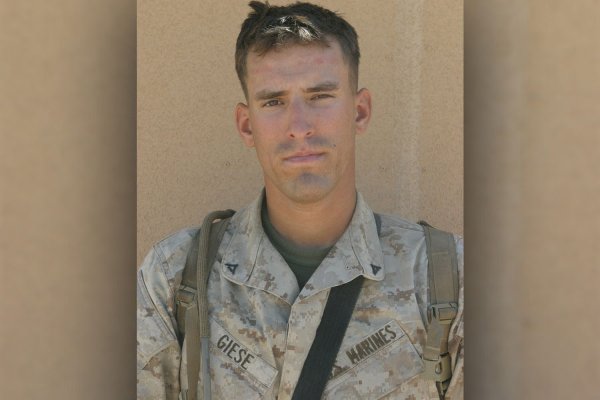ELYRIA, Ohio — Goose was on his last foot patrol.
He was 24 and had been in the Helmand Province in Afghanistan — “the worst of the hellhole” — for maybe five months, his dad said. The proud Marine had a new wife back in Georgia, and he was going to be shipping home to her soon.
But an improvised explosive device changed the ending to the story. One step and Lance Cpl. Joseph Ryan “Goose” Giese was gone.
A world away in Las Vegas, his dad Larry Giese was on the computer at exactly 9:03 a.m. Jan. 7, 2011, booking flights to go see his son’s battalion return to Camp Lejeune, North Carolina.
At 9:04 a.m., his world split apart forever.
It started with a knock. The retired Lorain, Ohio, police officer saw a Marine captain and a gunnery sergeant at his door. Giese, a former Marine himself, automatically saluted the captain.
“We got to the door and he didn’t really realize what was going on. He was more or less happy, like ‘Hi guys, I was a Marine, too’ — and then it sunk in, all of a sudden,” recalls now-Maj. Bob Stevenson, who was the captain at Giese’s door that morning.
Giese, who had served a tour in Southeast Asia, remembers thinking “that was how they delivered the message when I was in Vietnam.”
“And I said, ‘Just tell me he’s wounded,'” Giese said. “And they said, ‘No. He’s been killed.'”
That wound — of losing his only son, of having to tell his daughter that her little brother was not coming back — went to the bone. But in the nearly seven years since his son died, Giese has found a salve of sorts in the signs he believes his son is sending him.
There’s a reason Marines say “once a Marine, always a Marine.” The camaraderie doesn’t end on the battlefield; it doesn’t end at deployment or retirement. Semper fi — from the Latin “semper fidelis,” always faithful — extends over lifetimes, even over generations, any Marine will tell you.
And it certainly doesn’t end at death.
Package
“Six and a half years. Can you imagine finding a dog tag in the middle of the desert and it’s my son’s?”
Larry Giese can’t quite get over the package he received in the mail on June 14, sent by a stranger.
Inside was a single dog tag, dented, dulled and hard to read. Somewhere in Afghanistan — he still doesn’t know much of the details — an Army grunt found the tag, read the name, and sent it to his father, Pete Metzger, asking him to find the man’s family. Metzger tracked down Ryan’s widow in Atlanta, where Ryan had lived since his parents divorced when Ryan was 10.
She sent Giese a Facebook message: Call this man. If this is actually what I think it is, I want you to handle it.
All Giese knows is that the tag was found nowhere near where his son was killed in the Sangin River Valley. Ryan was part of the notorious “Green Hats,” Echo Company of the 2nd Battalion of the 9th Marines (the “2/9”). The 2/9 was deployed to Marjah, Afghanistan, in July 2010. By that December, Echo Company was sent to join the 3/5 Marines — which was taking higher casualties than any other Marine unit in Afghanistan — in Sangin.
Echo Company came to be known as the “Green Hats” after they chose to turn their hats inside out, with the green liners showing rather than the desert camouflage, while patrolling the heavy vegetation of the Helmand Province. They continued wearing their green hats once they met up with the 3/5, which didn’t go unnoticed by the enemy. According to company lore, a letter between two Taliban leaders was discovered in the area, discussing the reputation of the deadly green hats.
The attachment was to be short-lived, arriving in December and returning to North Carolina by Feb. 8. But within days, Echo Company lost three men.
Ryan was the last.


